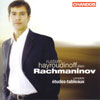Rachmaninov Etudes-tableaux
A flair for Rachmaninov that makes this player stand out from the crowd
View record and artist detailsRecord and Artist Details
Composer or Director: Sergey Rachmaninov
Genre:
Instrumental
Label: Chandos
Magazine Review Date: 2/2007
Media Format: CD or Download
Media Runtime: 62
Mastering:
Stereo
DDD
Catalogue Number: CHAN10391

Tracks:
| Composition | Artist Credit |
|---|---|
| (9) Etudes-tableaux |
Sergey Rachmaninov, Composer
Rustem Hayroudinoff, Piano Sergey Rachmaninov, Composer |
Author: Jeremy Nicholas
Rachmaninov’s first set of nine Etudes-tableaux was written in 1911 in tandem with the second set of Preludes, Op 32, which share a more daring harmonic language than earlier Rachmaninov works. The second set of nine (more extended) Etudes-tableaux composed seven years later and among the last works he wrote before leaving Russia for good, take this development further. I view them as miniature tone-poems.
Somehow I missed Rustem Hayroudinoff’s earlier Rachmaninov recordings (Preludes and the complete works for cello and piano), as well as his warmly received 2005 account of the Dvorák Concerto. On the evidence of his latest disc for Chandos, for whom he now records exclusively, they will be well worth acquiring. These are meticulously prepared and observed readings – if Rachmaninov asks for ppp legatissimo or sharply contrasted dynamics from one bar to the next, then Hayroudinoff takes the composer at his word, a courtesy to Rachmaninov not granted by every pianist.
But Hayroudinoff goes much further than mere accuracy. If he cannot quite equal the composer’s breathtaking nonchalance in the three he recorded (Op 33 Nos 2 & 7 in 1940, and Op 39 No 6 in 1925), he comes close. His rich tone and beefy attack serve him well in such passages as the ecstatic climax to the Op 39 E flat minor study (superbly paced and structured) and the pealing bells of Op 39 No 9; he sings with a touching simplicity in the C major and first of the A minor Op 39 studies. Temperamentally he is right inside the music. This is powerful Rachmaninov playing that transcends the artificial constraints of the recording studio.
Somehow I missed Rustem Hayroudinoff’s earlier Rachmaninov recordings (Preludes and the complete works for cello and piano), as well as his warmly received 2005 account of the Dvorák Concerto. On the evidence of his latest disc for Chandos, for whom he now records exclusively, they will be well worth acquiring. These are meticulously prepared and observed readings – if Rachmaninov asks for ppp legatissimo or sharply contrasted dynamics from one bar to the next, then Hayroudinoff takes the composer at his word, a courtesy to Rachmaninov not granted by every pianist.
But Hayroudinoff goes much further than mere accuracy. If he cannot quite equal the composer’s breathtaking nonchalance in the three he recorded (Op 33 Nos 2 & 7 in 1940, and Op 39 No 6 in 1925), he comes close. His rich tone and beefy attack serve him well in such passages as the ecstatic climax to the Op 39 E flat minor study (superbly paced and structured) and the pealing bells of Op 39 No 9; he sings with a touching simplicity in the C major and first of the A minor Op 39 studies. Temperamentally he is right inside the music. This is powerful Rachmaninov playing that transcends the artificial constraints of the recording studio.
Discover the world's largest classical music catalogue with Presto Music.

Gramophone Digital Club
- Digital Edition
- Digital Archive
- Reviews Database
- Full website access
From £8.75 / month
Subscribe
Gramophone Full Club
- Print Edition
- Digital Edition
- Digital Archive
- Reviews Database
- Full website access
From £11.00 / month
Subscribe
If you are a library, university or other organisation that would be interested in an institutional subscription to Gramophone please click here for further information.




